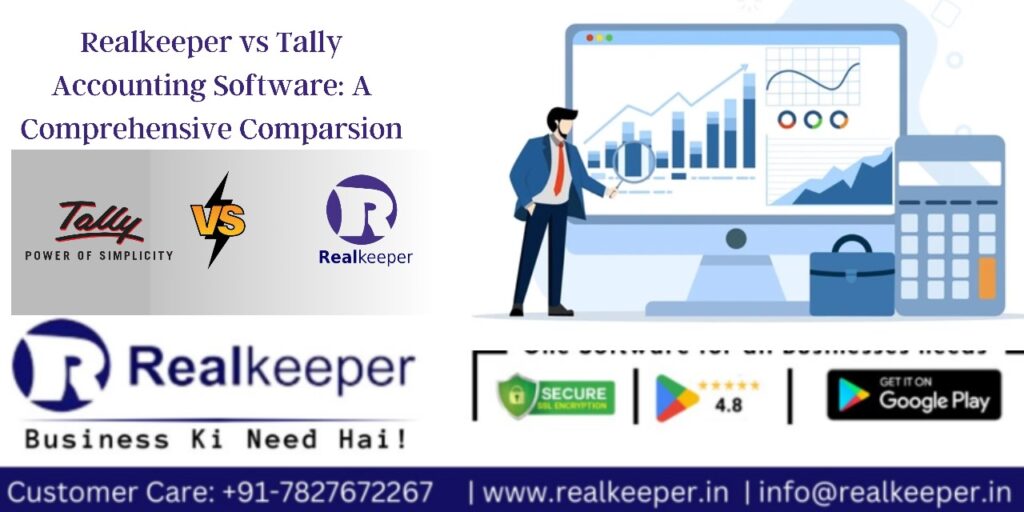
In today’s digital age, accounting software is pivotal for businesses of all sizes. From managing finances to automating invoices and taxes, choosing the right accounting software can significantly impact business efficiency. Among the many software solutions available, two stand out in particular: Realkeeper and Tally. While both offer essential accounting functions, they cater to different audiences and business needs. In this blog, we are discussing about Realkeeper vs Tally Accounting Software: A Comprehensive Comparison which software is no 1 for you .
1. Introduction to Realkeeper and Tally
Realkeeper is a cloud-based accounting and billing software designed specifically for freelancers, small businesses, and independent contractors. Its user-friendly interface, comprehensive invoicing system, and automation features make it a popular choice among startups and growing businesses.
Tally, on the other hand, is one of the oldest and most recognized accounting software in India, widely used for more than two decades. Its strong accounting and inventory management features have made it the go-to solution for medium to large businesses.
While both tools aim to streamline accounting operations, their functionalities, pricing, user experiences, and target markets differ significantly.
2. Ease of Use and User Interface
Realkeeper: Realkeeper is known for its straightforward and intuitive design. Its modern interface makes it easy for even non-accounting professionals to manage finances. Whether it’s generating invoices, managing expenses, or running reports, Realkeeper’s interface is clean, minimalistic, and designed with simplicity in mind. The dashboard offers a comprehensive view of the financial health of the business, enabling users to make informed decisions quickly.
Tally: Tally, being an older software, has a more traditional and complex interface. Its design is more suited for accountants and individuals who are familiar with accounting terminologies and processes. New users might find the navigation slightly overwhelming, and it typically requires some training to get the most out of its features. However, Tally’s power lies in its vast range of capabilities, which makes it an excellent tool for detailed financial management.
3. Core Features Comparison
Invoicing and Billing
Realkeeper: Realkeeper shines when it comes to invoicing and billing. It offers automated invoicing, allowing users to set up recurring bills, reminders, and instant payments. Its built-in GST compliance features make it ideal for small retail stores and freelancers needing quick billing solutions. Users can generate customized invoices that fit their brand, and the software supports multi-currency invoicing for businesses with international clients.
Tally: Tally’s invoicing is more robust, with features like batch-wise billing, multiple price levels, and advanced discounting options. However, it lacks the automation aspect that Realkeeper offers. Users must manually generate invoices and set up payment reminders, which may take more time. Tally also supports GST billing but in a more manual, structured format.
Expense Management
Realkeeper: Realkeeper’s expense management system is simple yet effective. Users can categorize expenses, track them in real-time, and get detailed reports to understand their spending patterns. Its cloud-based access ensures that businesses can log expenses from anywhere, using any device.
Tally: Tally offers a more detailed expense management system that allows users to allocate expenses to different cost centers. This makes it suitable for large businesses with multiple departments. However, it requires users to have a better understanding of accounting principles to leverage its full potential.
Inventory Management
Realkeeper: Inventory management in Realkeeper is quite basic, designed for small businesses that do not require advanced inventory tracking. It allows for simple product management, pricing, and stock level updates.
Tally: Tally is far superior when it comes to inventory management. It offers a vast range of features, including batch-wise tracking, reorder levels, multiple warehouses, and item-wise stock valuation. This makes Tally an ideal solution for businesses that need in-depth inventory control.
Reporting and Analytics
Realkeeper: Realkeeper provides simple, visually appealing reports that can be generated with just a few clicks. It offers sales reports, tax summaries, and expense breakdowns, giving businesses a clear view of their financial health. Realkeeper’s emphasis is on making reporting accessible and easy to understand for small business owners.
Tally: Tally offers comprehensive reporting tools. Users can generate everything from financial statements to inventory reports, GST summaries, and cost center-wise profit analysis. However, its reporting system is more technical, and users need to be familiar with accounting terminologies to fully utilize its reporting capabilities.
4. Cloud vs On-Premises Solutions
Realkeeper: Realkeeper is a fully cloud-based solution. This means users can access their accounting data from any device with an internet connection. Cloud-based solutions also come with automatic backups, ensuring that data is safe and always accessible. For small businesses or freelancers who may need access on the go, Realkeeper is a great choice.
Tally: Tally is traditionally an on-premises software, though recent versions such as TallyPrime offer some cloud functionality. Tally users can still manage data backups, but it requires manual setups for cloud storage. While Tally provides remote access options, it lacks the flexibility and real-time synchronization that a fully cloud-based solution like Realkeeper offers.
5. GST Compliance
Realkeeper: Realkeeper is highly focused on making GST compliance easy for businesses. It provides automated GST calculations, integrates directly with the GST portal, and allows for easy GST return filing. Small businesses, especially in India, can greatly benefit from the software’s simplified GST functionality.
Tally: Tally also offers strong GST compliance features, but its implementation is more complex. Users need to manually configure GST settings and ensure that all transactions are tagged correctly. For businesses with more advanced GST requirements, Tally offers better customization, but it requires a steeper learning curve.
6. Pricing and Affordability
Realkeeper: Realkeeper’s pricing is designed to cater to small businesses, freelancers, and startups. It offers affordable monthly and annual subscription plans, making it a budget-friendly option for businesses that are just starting out. The cloud-based nature of the software also eliminates the need for heavy infrastructure investments.
Tally: Tally is more expensive in comparison, primarily because of its one-time purchase model for the software. While Tally offers more advanced features, its pricing might be prohibitive for small businesses. Additionally, businesses need to factor in the cost of periodic upgrades and maintenance, which can add to the overall expense.
7. Customer Support and Community
Realkeeper: Realkeeper provides 24/7 customer support via live chat, email, and phone. Its customer support is praised for being responsive, especially for small business owners who may not have the technical knowledge to troubleshoot problems. Realkeeper also offers extensive online resources such as tutorials and guides.
Tally: Tally offers customer support through authorized partners and service centers. While the support is robust, especially for larger businesses, smaller businesses might find it harder to get immediate help. Tally’s community is vast, given its longstanding presence in the market, but it often requires the assistance of certified professionals to resolve complex issues.
8. Conclusion: Which One Should You Choose?
The choice between Realkeeper and Tally depends largely on the size and needs of your business.
- Realkeeper is ideal for freelancers, small business owners, and startups who need a simple, affordable, and cloud-based solution. It’s user-friendly, offers essential features like automated invoicing, GST compliance, and real-time expense management, and is well-suited for businesses that don’t require advanced inventory or financial management.
- Tally, on the other hand, is better suited for medium to large businesses that require detailed accounting, inventory control, and advanced financial reporting. While it comes with a steeper learning curve and higher upfront costs, it offers unparalleled flexibility and depth for businesses that need full-fledged accounting capabilities.
Ultimately, the decision boils down to your business’s complexity, budget, and the level of customization required. If you’re looking for a cloud-based, easy-to-use solution, Realkeeper is a great option.



